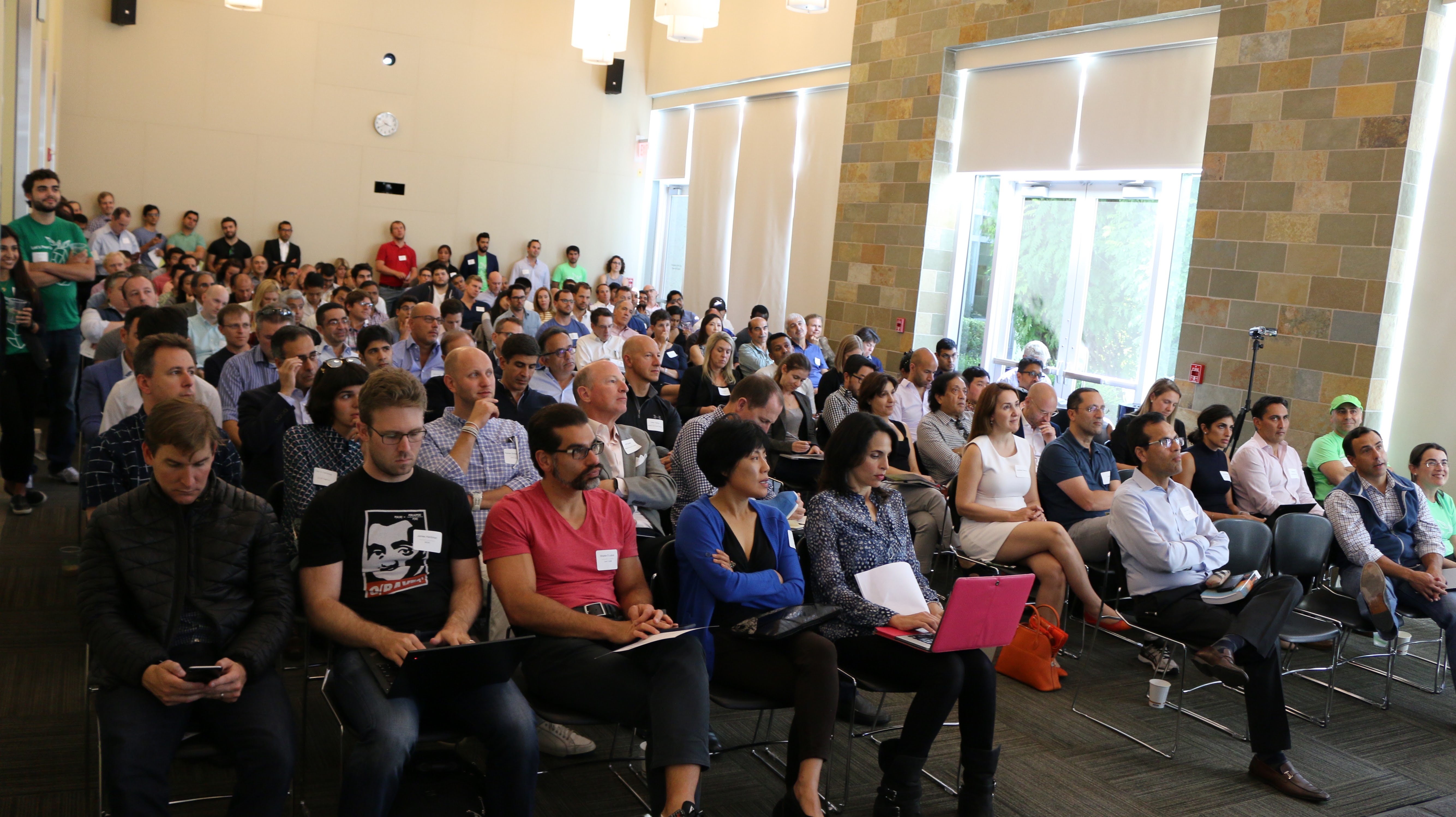Good Tuesday morning, everyone! We’re so sorry to those of you who tried and couldn’t click through yesterday’s assortment of links. Our ESP was doing some closed-curtain emergency maintenance until around noon PST. (We’re just relieved that we didn’t find a digital dust pile when we were allowed back into the system.)
—–
Top News in the A.M.
AT&T will be the exclusive carrier for Amazon‘s new smartphone, which is expected to be unveiled tomorrow, according to WSJ sources.
—–
True Seed Investors
In recent years, the bar has been steadily rising for funding rounds of all sizes, including seed rounds. Indeed, last week, early-stage investor Jeff Clavier told us that “there are way more seed [stage] VCs investing at the same time – when there are proof points – than those who just go with their gut instincts.”
Clavier readily admits that he’s among those looking for early products, not ideas, as was once the case. His firm, SoftTech VC, pores over the business ideas of between 500 and 750 companies each quarter and invests in just four or five of them. Given so many proposals, startups with traction inevitably stand out. “We need a way to filter them somehow,” he explained.
Still, as round sizes and valuations shoot upwards, and VCs like Clavier focus on the numbers that can justify their increasingly large bets, a contrarian opportunity has arisen for investors who are willing to just go with their gut. One daredevil that falls in this category is venture capitalist Manu Kumar, a man renowned in Silicon Valley for helping massage messy concepts into fundable businesses. Others include Pejman Nozad and Mar Hershenson, founders of the eponymous early-stage firm Pejman Mar. As Hershenson, who I met with last week, told me, “We invest super early, when there are two or three people and no product. It’s what true seed meant a long time ago.”
Hershenson and Nozad – a former rug dealer turned highly successful angel investor – are rushing into this void with open arms. With a debut fund of $40 million, the 10-month-old firm has already backed a dozen teams, half of which have gone on to raise additional funding from heavy-hitting venture firms, including from Sequoia Capital, Kleiner Perkins Caufield & Byers, Canaan Partners, and Khosla Ventures. (Guardant Health and DoorDash are among those to raise a follow-on round. Soon to be in the market – EagerPanda, a semantic search startup.)
Nozad’s reputation for risk-taking has become a huge source of dealflow, a fact which Hershenson knows from first-hand experience. Fifteen years ago, her husband, Matt, co-founded Danger, an early smartphone company. When he was trying to get the company off the ground, he knocked on investors’ doors for nine solid months. “One day,” she recalls, “Matt came home and said, ‘Well, Pejman Nozad is giving us money.’ I said, ‘Who is Pejman?’ Matt said, ‘He sells rugs.’ It was like, ‘What?!’” Microsoft subsequently acquired Danger in 2008 for $500 million
Hershenson – herself a three-time entrepreneur who remained friends with Nozad over the years – also drums up deal flow by spending her days at Stanford, where she received her PhD in electrical engineering.
“I’m there all the time – when there are final project classes, if they need anyone to judge [a competition] or [give a] talk. We’re close with the students and with the organizations at the school.” There are “a lot of amazing people at Stanford,” she adds. “There’s plenty for everybody – let’s put it that way.”
In fact, the firm is hosting six “companies” from Stanford this summer at its 5,000-square-foot office in downtown Palo Alto, Ca.
“We don’t run it like an incubator: some of them are graduating but some will go back to school,” she explains. Still, Pejman Mar is giving each between $15,000 and $25,000 in convertible, uncapped notes.
“We won’t count them as portfolio companies,” she tells me. They’re too nascent. Later on, though, who knows? “Maybe some of them will work out,” she says with a smile.
—–
New Fundings
BitGo, a year-old, Bay Area-based bitcoin security platform aimed at making virtual currency easier and safer to use, has raised $12 million in funding, including from Redpoint Ventures; Bitcoin Opportunity Corporation, a Bitcoin investment vehicle run by the entrepreneur Barry Silbert; and Ashton Kutcher’s A-Grade Investments. Dealbook has morehere.
BuzzFeed, the 5.5-year-old, New York-based media company may raise a $200 million funding round — its fifth to date — reports VentureBeat. The company has raised $46.3 million to date, including from New Enterprise Associates, Lerer Ventures, RRE Ventures, Hearst Ventures, and SV Angel. Asked for comment, a BuzzFeed spokesperson told VentureBeat, “We don’t comment on rumors and speculation.”
Clari, a two-year-old, San Francisco-based mobile sales productivity platform, has raised $20 million in Series B funding led by Bain Capital Ventures. Northgate Capital also participated in the round, along with earlier investor Sequoia Capital. The company has raised $26 million altogether, shows Crunchbase.
Cloud Elements, a two-year-old, Denver-based cloud API integration service, has raised $3.1 million in Series A funding led by Grotech Ventures and Icon Venture Partners, with participation from Galvanize Ventures.
Crobo, a three-year-old, Berlin-based online gamer acquisition network, has raised $5.7 million from unnamed investors to double its team and continue to expand in Asia and the U.S.
LeukoDx, a five-year-old, Towson, Md.-based medical diagnostics company that makes a test to diagnose sepsis and other conditions, has raised $7 million in new funding from the private equity group Axcel Partners and individual investors. The company has raised $9.3 million to date, shows Crunchbase.
PowerVision, a 12-year-old, Belmont, Ca.-based medical device company that’s developing implantable intraocular lenses, has raised $30 million in Series D funding. New investors Aisling Capital and Correlation Venture Partners joined earlier investor Venrock to add $10 million to the $20 million that the company closed on earlier this year. Others of the company’s investors include Advanced Technology Ventures, Frazier Healthcare, Johnson & Johnson Development Corp., and Medtronic. The company has raised at least $86.5 million to date, shows Crunchbase.
Tapatalk, a five-year-old, L.A.-based social app that aggregates discussions from forums all over the Internet, has raised $5.8 million in funding from Floodgate and Accel Partners. The company, founded in Shanghai, had relocated to California to participate in the 2.5-year-old, Santa Monica, Ca.-based accelerator, MuckerLab.
True North Therapeutics, a year-old, South San Francisco-based biotechnology company that’s developing therapies designed to treat autoantibody-driven rare diseases, has raised $22 million in Series A funding. Backers include Kleiner Perkins Caufield & Byers, MPM Capital, SR One, Biogen Idec New Ventures, and Baxter Ventures. Last year, True North was spun out of another privately held biotech company, iPierian, which was acquired in April by Bristol-Myers Squibb.
UCloud, a two-year-old, Shanghai-based cloud computing infrastructure and services company that aims to be the Amazon Web Services of China, says TechCrunch, has raised $50 million in Series B funding led by Bertelsmann Asia Investments and Legend Capital. The company had previously raised $10 million in Series A funding from Bertelsmann, along with DCM.
VeloCloud, a two-year-old, Los Altos, Ca.-based company whose software delivers wide-area networking services through the cloud, has raised $21 million in new funding led by New Enterprise Associates, with participation from Venrock and The Fabric, a networking incubator.
Victorious, a 13-month-old, L.A.-based startup that is reportedly looking to help YouTube stars create their own revenue-generating sites and apps, is raising a $13 million round led by Kleiner Perkins Caufield & Byers, with Lowercase Capital and former YouTube executive Dean Gilbert also participating. Recode has the story here.
Virtru, a 2.5-year-old, Washington, D.C.-based company whose encryption software enables email users to revoke emails, prevent forwards, and set expiration dates (among other things), has raised $6 million in new funding led by Bessemer Venture Partners. The company, which raised $4.3 million in debt financing earlier this year, has raised $10.3 million altogether.
Walker & Co., a year-old, Palo Alto, Ca.-based company that makes razors and shave creams with African-Americans in mind, has raised $6.9 million in Series A financing from earlier investors to expand its product line. Andreessen Horowitz led the round. Upfront Ventures, Collaborative Fund, Daher Capital, and Johnson + Partners also participated.
Weaved, a seven-month-old, Palo Alto, Ca.-based company whose technology is focused on securely networking devices across the Internet, has raised $250,000 in seed funding from TMT Investments, a four-year-old firm that’s based in St. Helier in the English Channel and which expressly backs seed-stage startups that focus on the so-called Internet of Things.
XiaoZhu, a two-year-old, Beijing-based company that aspires to become China’s Airbnb, has raised $15 million in Series B funding led by Legend Capital, with earlier investor Morningside Venture Capital, participating. According to China Money Network, the company currently has operations in 13 Chinese cities and provides connects users with lodging in more than 130 cities in the country.
—–
New Funds
Bull City Venture Partners, a two-year-old, Durham, N.C.-based early-stage firm that invests in companies in and around North Carolina, has closed a $26 million third fund from LPs that include Blue Cross and Blue Shield of North Carolina, Capitol Broadcasting Company, Cisco, venture capitalist Brad Feld, Grosvenor Capital Management, Industry Ventures and Red Hat.
The family behind Dolby Laboratories is launching a new, early-stage venture fund to formalize its “ongoing, multi-generational commitment to supporting talented entrepreneurs.” Longtime VC Pascal Levensohn, who wound down his own venture firm in 2010, has joined the outfit to invest in new startups and determine which companies in its portfolio merit follow-on funding. TechCrunch has more here.
McDonald’s has launched a digital incubator in Silicon Valley, prompting at least one nerd to ask: Can I have fries with that augmented reality app? (Yes, fine, StrictlyVC is that nerd.) The fast-good giant isn’t sharing much yet, but TechCrunch has more here.
Nauta Capital, a 10-year-old, Barcelona-based early-stage venture fund focused on Spanish startups, is raising a fourth fund and targeting $150 million for the effort, reports VentureWire. The firm, which closed its third fund with $150 milllion in 2011, counts ForceManager, a Barcelona-based company that makes a sales force management system, among its most recent investments.
—–
IPOs
Trupanion, a 14-year-old, Seattle-based company that provides medical insurance for dogs and cats, has filed for an IPO. The company had raised at least $9 million from investors, shows Crunchbase. Its biggest shareholders include Maveron, which owns a 33.7 stake in the business; Highland Capital Partners, which owns 15.8 percent; and RenaissanceRe Ventures, which owns 12.7 percent.
U.S. IPOs expected to price this week.
—–
Exits
Fusion-io, the eight-year-old, Salt Lake City, Ut.-based flash storage gear company, is being acquired by its older rival SanDisk, for about $1.3 billion. Both companies are publicly traded. Reuters has more here.
Parastructure, a two-year-old, San Francisco-based startup that builds data-analysis software on top of open source infrastructure, has been acquired by Dropbox. Terms of the deal aren’t being disclosed, though a “reliable” TechCrunch source says the company was purchased for an amount in the “lower eight figures.” The company hadn’t publicly disclosed any outside funding.
Streem, a two-year-old, San Francisco-based, cloud-based subscription service that offers users unlimited storage for music, movies, and other online content, is being acquired for an undisclosed amount of cash and stock by Box, the cloud-based file-management service. Streem has raised $875,000 in seed funding from Y Combinator, 500 Startups, Start Fund, IronFire Capital, Arbor Ventures, and numerous angel investors.
—–
People
“Dilbert” creator Scott Adams, who spent many years lampooning cubicle culture has a.) cofounded an Internet startup and b.) wrote a post yesterday about so-called pivots — without mocking them even a little bit.
Dan Slagen, senior VP of marketing at Nanigans, a Boston-based Facebook ad software firm, has left to become the chief marketing officer of HourlyNerd, a Boston-based online marketplace matching MBAs with businesses needed part-time or hourly work. Beta Boston has the news here.
The tech world is “gearing up for its own destination wedding of the century,” reports PageSix, which has some details on the upcoming wedding in Italy of Nikesh Arora, Google‘s chief business officer, and real estate executive Ayesha Thapar. Guests are reportedly expected to include Google cofounders Larry Page and Sergey Brin, along with Facebook CEO Mark Zuckerberg.
—–
Job Listings
Instacart, the San Francisco-based same-day-delivery service that yesterday announced $44 million in new funding, is looking for a business development lead.
—-
Essential Reads
Is Klarna the new PayPal?
Wired gets a rare peek into Amazon‘s fulfillment operations.
Why customized ads are so creepy to us: “I am never quite sure if Facebook’s advertising algorithms know nothing about me, or more than I can admit to myself.”
—–
Detours
A bazillionaire’s guide to stress relief.
Why so many people put off going to bed, even when they know they’ll regret it the next morning.
—–
Retail Therapy
Exactly. Why buy all that extraneous material for your torso when all you really want is the hoodie?
—–
To sign up for StrictlyVC, click here. To advertise, click here.
 As dozens of Teslas baked in the sprawling Palo Alto parking lot of a local law firm yesterday, 100 top investors packed into a high-ceilinged meeting room. There, they listened as 13 startups deliver four-minute presentations about why they’re worth watching.
As dozens of Teslas baked in the sprawling Palo Alto parking lot of a local law firm yesterday, 100 top investors packed into a high-ceilinged meeting room. There, they listened as 13 startups deliver four-minute presentations about why they’re worth watching.






